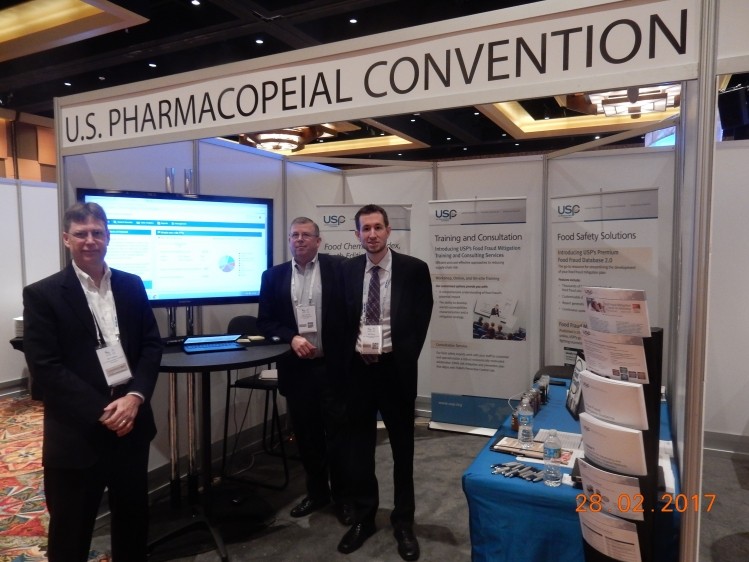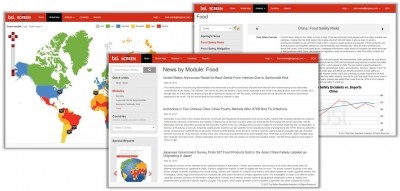Dispatches from GFSI 2017 in Houston
Alchemy and USP partner to assess supply chain risk

The partnership combines Alchemy’s food fraud risk assessment and mitigation services with USP’s food fraud database and expertise.
It will start in North America but plans are to roll out internationally as the partnership grows.
Alchemy is a provider of food safety programs used at more than 25,000 facilities in 50 countries.
USP’s food fraud database is a source of information on food fraud risk for thousands of ingredients. The database was launched in July last year and is updated daily with 40% of subscriptions from international locations and the data entered being global.
USP expertise and Alchemy contacts
Bill Folkerts, VP of strategic marketing and program operations for the food program at USP, said the collaboration will help quality and safety professionals to assess and mitigate food fraud risks.
“The dialogue between Alchemy and USP started about six months ago and through attendance at the Alchemy conference we helped to establish early thinking of how we could work together,” he told FoodQualityNews at the Global Food Safety Conference in Houston, Texas.
“This then led to some brainstorming opportunities which we did jointly at our facility in Rockville and that led to a clear indication of how we could work together. That has led to formalised agreements around the re-selling of our food fraud database and related services associated with mitigating risk and food fraud.”
Alchemy works with manufacturers following the Global Food Safety Initiative (GFSI) standards including SQF, BRC, and FSSC 22000 certifications which require food fraud protections
Jeff Eastman, Alchemy’s CEO, said its footprint enables the firm to go out to customers and talk to them about the services.
“We’ve started with two or three services, one being an assessment piece to come out and do an assessment using the database and we can put mitigation plans as a follow-up behind that using the expertise of USP,” he told us.
“We are the company that has a lot of food relationships and we can leverage this quickly. Our focus is creating products and services that can create efficiencies within food facilities and with the scientific background and the subject matter expertise USP brings to that it adds credibility to that voice and that is something we think combined food companies will be receptive to.”
USP is a non-profit public health organization that sets standards for the identity, quality and purity of food ingredients and dietary supplements manufactured, distributed and consumed worldwide.
Jeff Moore, senior science director at USP, said there are three main drivers for organisations to look at the problem of food fraud.
“One of those is from a regulatory perspective so if you look at FSMA in the US and the Preventive Control rule there is a new requirement when it comes to identifying hazards, to look at that through the lens of potential economic adulterants that could be introduced into supply chains,” he told us.
“Another element is brand protection, so protecting your organisation, making sure you are doing the right thing to protect the brands you built equity in.
“The last driver is voluntary standards, GFSI is one of those, with new requirements coming out for food safety schemes to adopt and incorporate food fraud vulnerability assessments and control plans into those systems.”
Not just ticking the boxes
Eastman said companies have struggled to keep up with adulteration risks in an increasingly global ingredient supply but they “definitely care” about food fraud and it is not just a regulatory compliance issue.
“You see more and more retailers who are putting in a lot of measures to try to protect themselves because one of the big drivers of all this regulation has been we are all much more aware of the food we eat,” he said.
“We are very critical of the food that comes through the retailers and we are conscious, you see examples of things that happened at Chipotle to retailers to grocery stores, and consumers are very aware of where the products come from. So I think the companies most definitely care and it is not just regulatory compliance.
“What is interesting about GFSI is that GFSI are guidelines, it is not a regulatory body, they are providing best practices and most of the larger companies have adopted that as a standard. So that is not completely regulatory driven, there are things like FSMA that are starting to require that.
“In the instances where we have seen intentional problems or ignoring food issues there have been major consequences for that and so executives know they can go to jail.”
Eastman said it will start with the professional services group - which is a group of consultants that go to sites and do workplace safety and food safety audits.
“They are certified auditors to several other standards so they help companies prepare for SQF and this is a great add on to that component as it is part of the regulatory compliance that they have to work on,” he said.
“As we continue to learn from that group and the experiences they have providing consulting services, then we look at communications or operational things we can add to our current suite of technology products.
“A lot of people think of Alchemy just as an online training company but we’ve also got a professional services group that fits right into of what we are trying to do. We may eventually hook up technologies through the customer base so there are a lot of possibilities here, we’ll take it a step at a time and learn as we go.”

















